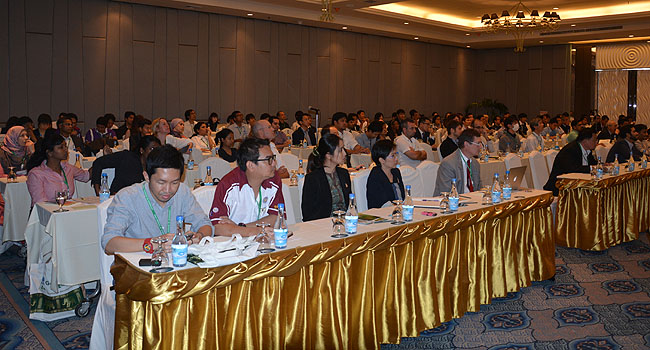International experts attending the ICUE
2014: Green Energy for Sustainable Development Conference organized on
March 19-21 in Thailand by the Asian Institute of Technology (AIT)
considered a raft of options for moving the planet away from
carbon-based fuels towards renewable energies.
The three-day conference assessed social,
technological, financial and investment aspects for achieving
low-carbon growth, as well as national and regional energy development
policies geared towards achieving sustainability for the planet. In
Pattaya, leading scientists exchanged research ideas, experiences, and
the latest technical innovations in green energy utilization.
Energy professionals, policy makers,
researchers and academics from around the world agreed that green
growth must play a key role in raising living standards, providing
access to modern energy services and protecting the earth’s
environment.
“A low-carbon based type of economy will
help mitigate environmental pollution and CO2 emissions caused by
fossil fuel use, help reduce reliance on dwindling fossil reserves, and
encourage technological innovations,” said conference director Dr.
Shobhakar Dhakal, Associate Professor of energy, AIT.
At the same time, renewable sources of
energy such as solar, wind, hydropower, biomass, and geothermal present
countries with significant financial opportunities, particularly in
Asia, the experts said.
Still, keynote speaker Dr. Piyasvasti
Amranand, Chairman, Energy for Environment Foundation, maintained that
the enormous potential for solar energy in Thailand is hampered by
sclerotic government processes that inhibit development of a smart
energy grid.
The former Thai Minister of Energy called
for independent regulators to eliminate the red-tape and dubious
practices which present obstacles to growth of the domestic renewable
energy sector.
By freeing up the energy market pricing
system, enforcing transparent permitting processes, and introducing
efficiency standards and financing mechanisms “Thailand can realize its
25% target for renewable energy by 2021,” the senior official
said.
Calling the region a “lack of energy
hotspot” Yale University’s Prof. Arnulf Grübler said 800 million of the
world’s 1.4 billion people without access to electricity reside in
Asia. The region also lags OECD countries by approximately 100 years in
terms of primary energy inputs, he said.
Tapping into the enormous US$ 1-5
trillion global market for diffuse green investments – such as
retrofitting buildings for higher energy efficiency – phasing out
fossil fuel models, and correcting the misalignment of public policy
and investment are necessary steps to take in the journey from
non-renewable to renewable energy, Grübler said.
And while there is no single “silver
bullet”, Grübler, who is Lead Author and Contributing Editor of the
just released Intergovernmental Panel on Climate Change (IPCC) Fifth
Assessment Report, recommended development of a green energy and
innovations “ecology” that addresses areas of underinvestment and
responds to market demand. Here, fast-growing Asia has an opportunity
to maximize energy efficiencies in public transportation, ITC, and
electrical and gas infrastructure sectors, he said.
Dr. Shuzo Nishioka, Senior Research
Advisor at Japan’s Institute for Global Environment Strategies raised
the bar further, suggesting that with climate change as the main
trigger “Asia has an opportunity to leap-frog the rest of the world in
transitioning to green growth through innovation.”
PHOTO GALLERY OF THE CONFERENCE


